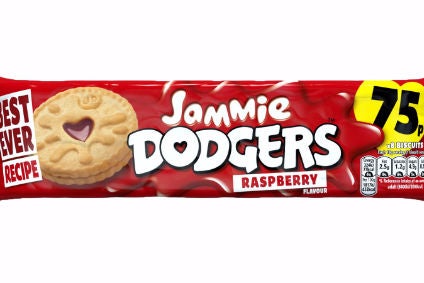
UK-based Burton’s Biscuit Co. has said it is set to launch a “transformational growth plan” across its core brands, following the sale of its Cadbury biscuit licence to Mondelez International.
Burton’s said that following the sale, announced on Friday (12 August), it will “continue to invest in innovation to grow” and boost sales across its core brands including Maryland, Jammie Dodgers, Wagon Wheels and Fish’n’Chips.

Discover B2B Marketing That Performs
Combine business intelligence and editorial excellence to reach engaged professionals across 36 leading media platforms.
The licence sale “will also support Burton’s ambition to be the number one manufacturer of premium branded and private-label biscuits and snacks and to continue to grow its contract manufacturing business”, the company said.
“Burton’s has successfully grown the Cadbury biscuit business to become one of the leading biscuit brands around the world with strong positions in the UK and Ireland and established and growing businesses in France, North America and the Middle East,” the company said.
Under the terms of the licence sale, which is subject to regulatory approval and closing conditions, Burton’s said Mondelez International will be able to manufacture, market and sell Cadbury-branded biscuits including Cadbury Fingers and Cadbury Animals alongside Cadbury chocolate all around the world.
“Both companies have agreed that Cadbury-branded biscuits will continue to be produced in Burton’s factories by Burton’s employees under a co-manufacturing agreement,” Burton’s said.

US Tariffs are shifting - will you react or anticipate?
Don’t let policy changes catch you off guard. Stay proactive with real-time data and expert analysis.
By GlobalDataBurton’s, which is based in St Albans, Hertfordshire, operates manufacturing sites in Blackpool, Edinburgh, Llantarnam, and a chocolate refinery in Moreton, employing more than 2,000.
Hubert Weber, the president of Mondelez’s operations in Europe, said on Friday ownership of the Cadbury biscuits licence “offers us exciting opportunities to accelerate global growth and innovation, as we expand our leading position in biscuits, globally and in Europe”. He said the deal “will help us to unify and expand our global Cadbury biscuits portfolio in key markets”.
Last month, Mondelez revised its forecast for how much the US snacks giant’s revenues would grow on an organic basis in 2016. The Oreo and Cadbury owner said it believed its organic net revenue, which excludes factors like M&A and exchange rates, would grow by approximately 2% this year. In May, the company had set out an estimate for growth of “at least 2%”.





